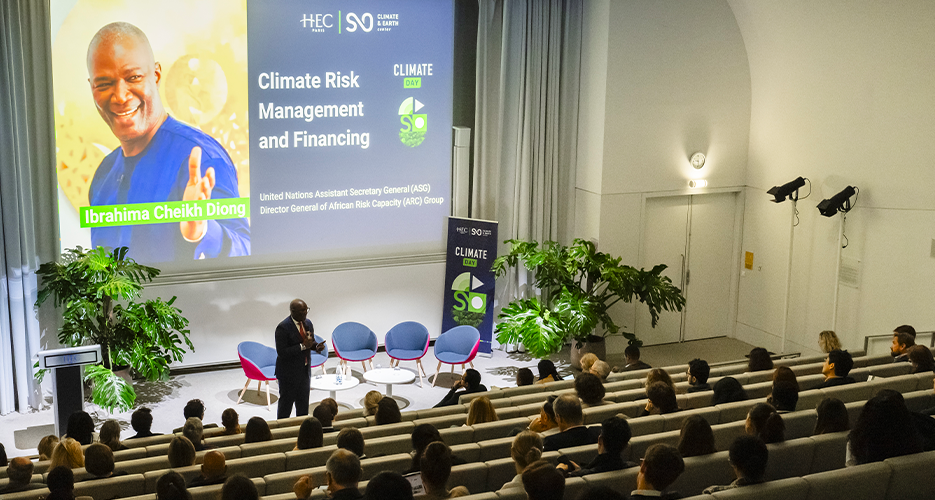Financing Climate Risks in Africa: Insights from the UN Assistant Secretary General
Financing Climate Risks in Africa: Insights from the UN Assistant Secretary GeneralThe keynote speech at the HEC Climate Day, organized by the Climate & Earth Center, was delivered by Ibrahima Diong. He highlighted the importance of bridging the academic world with on-the-ground efforts to build climate resilience across Africa. The UN Assistant Secretary General and Director General of the African Risk Capacity (ARC) Group emphasized that HEC Paris can play a crucial role in this endeavor by providing data management, risk profiling, and innovative responses to climate change challenges. Diong and HEC dean Eloïc Peyrache are exploring ways to establish a strategic partnership between the two institutions.
Ibrahima Diong's participation at HEC’s third Climate Day aimed to foster a collaborative environment where academia and practitioners could share knowledge and resources. The event was overseen by the school's Climate & Earth Center which seeks to align value chains and business models with planetary boundaries. The two bodies, he hopes, will strengthen resilience, particularly for the most vulnerable populations. After the daylong conference, this specialist in climate risk insurance shared his long-term vision of capacity building for Africa. But first, he turned to the importance of the partnership between HEC and his African Risk Capacity Group: “This partnership represents a critical step towards building a resilient Africa. By integrating HEC Paris' academic rigor and ARC’s on-the-ground experience, we can develop innovative solutions that address the unique challenges faced by African nations in the face of climate change.” After his keynote speech, the ARC Director General mapped out the three key areas for collaboration:
- Risk Profiling and Data Management: effective climate resilience begins with understanding and managing risk profiles. Diong underlined how accurate and credible models are essential for countries to follow and trust. And this is where leading research institutions like HEC come in. Indeed, collaborating with academic bodies enhances the reliability of these models, making them more effective in predicting and mitigating climate risks.
- Capacity Building: Beyond financing, Diong believes it is crucial to build the capacity of African countries to handle climate challenges independently. This aligns with the philosophy of "African solutions to African problems." With this foundational principle, partnerships with universities can help train and equip local experts to gain autonomy and manage climate risks effectively.
- Knowledge Management and Thought Leadership: HEC Paris and ARC can jointly contribute to knowledge management and thought leadership in climate action. By showcasing successful collaborations and sharing insights, the two partners can inspire and guide further efforts in building climate resilience. Diong also said he is looking forward to welcoming HEC students to ARC, where they could apply their academic knowledge to real-world challenges, while African professionals could share their expertise with the university's community. These will focus on analysis of climate date and climate risk profiles; knowledge management; climate finance and innovation; developing a joint flagship project and its fundraising efforts; dissemination of the results of the partnership at future COP events.
Inspiring the Next Generation
Ibrahima Diong urged students to adopt a mindset that they can be part of the solution to climate challenges. By engaging with real-world problems through their research and academic work, he insisted that students can develop innovative solutions that contribute to building resilience across Africa. By way of example, Diong discussed the issue of droughts in Africa. Typically, governments respond to droughts reactively, mobilizing resources only after disasters strike. This approach often results in delayed responses and inadequate resources, exacerbating the impact on affected communities. The Senegalese statesman emphasized the need for proactive risk modeling and early warning systems, areas where academic research can significantly contribute. Improved models and data management can help governments anticipate and prepare for droughts, ensuring timely and effective interventions.

Ibrahima Diong addressing Climate Day participants © Marcella Barbieri
Addressing Climate Finance at COP 29
With the upcoming COP 29 in Baku, dubbed the “Finance COP”, there is a heightened expectation for increased financial commitments to address climate adaptation and resilience needs in Africa. This is in the context of last year’s historic agreement to help developing countries cope with the effects of climate change through a Loss and Damage Fund. Diong highlighted the importance of renewing these commitments and ensuring that resources are directed where they are most needed. He emphasized the human face of climate change, noting that the ultimate measure of success in climate action is the ability to save lives and protect the most vulnerable.
Enhancing Coordination and Collaboration
The statesman also reflected on the recent Africa Climate Roundtable in Johannesburg, which his ARC Group oversaw. The roundtable focused on understanding the demand side of climate finance and ensuring that available resources are effectively allocated. It brought together multiple conveners to discuss existing initiatives and best practices, emphasizing the importance of coordination in utilizing resources efficiently. The goal was to avoid fragmented efforts and ensure that funding is used strategically to build resilience across the continent.
Coordinating the roundtable, Diong felt these are challenges HEC could help address: “We see lots of resources coming in,” he said, “but it's poorly coordinated. In other words, we're bringing different solutions to the table, but the additional sources available must be coordinated in a way that we can get Africa to build resilience. An effective loss and damages policy can then be operational. This is a fight we've been leading for a number of years. The polluters must pay and those who contribute to climate change have the moral responsibility in making funding available so we can build a more resilient Africa.”